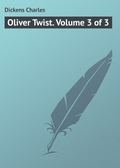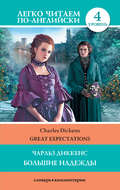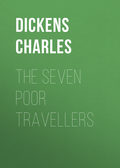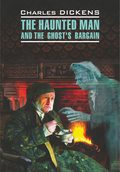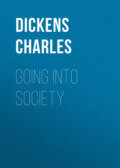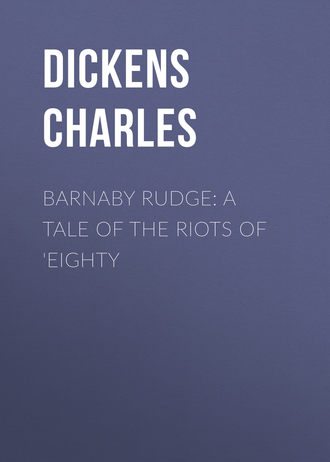
Чарльз Диккенс
Barnaby Rudge: A Tale of the Riots of 'Eighty
Chapter 57
Barnaby, armed as we have seen, continued to pace up and down before the stable-door; glad to be alone again, and heartily rejoicing in the unaccustomed silence and tranquillity. After the whirl of noise and riot in which the last two days had been passed, the pleasures of solitude and peace were enhanced a thousandfold. He felt quite happy; and as he leaned upon his staff and mused, a bright smile overspread his face, and none but cheerful visions floated into his brain.
Had he no thoughts of her, whose sole delight he was, and whom he had unconsciously plunged in such bitter sorrow and such deep affliction? Oh, yes. She was at the heart of all his cheerful hopes and proud reflections. It was she whom all this honour and distinction were to gladden; the joy and profit were for her. What delight it gave her to hear of the bravery of her poor boy! Ah! He would have known that, without Hugh’s telling him. And what a precious thing it was to know she lived so happily, and heard with so much pride (he pictured to himself her look when they told her) that he was in such high esteem: bold among the boldest, and trusted before them all! And when these frays were over, and the good lord had conquered his enemies, and they were all at peace again, and he and she were rich, what happiness they would have in talking of these troubled times when he was a great soldier: and when they sat alone together in the tranquil twilight, and she had no longer reason to be anxious for the morrow, what pleasure would he have in the reflection that this was his doing – his – poor foolish Barnaby’s; and in patting her on the cheek, and saying with a merry laugh, ‘Am I silly now, mother – am I silly now?’
With a lighter heart and step, and eyes the brighter for the happy tear that dimmed them for a moment, Barnaby resumed his walk; and singing gaily to himself, kept guard upon his quiet post.
His comrade Grip, the partner of his watch, though fond of basking in the sunshine, preferred to-day to walk about the stable; having a great deal to do in the way of scattering the straw, hiding under it such small articles as had been casually left about, and haunting Hugh’s bed, to which he seemed to have taken a particular attachment. Sometimes Barnaby looked in and called him, and then he came hopping out; but he merely did this as a concession to his master’s weakness, and soon returned again to his own grave pursuits: peering into the straw with his bill, and rapidly covering up the place, as if, Midas-like, he were whispering secrets to the earth and burying them; constantly busying himself upon the sly; and affecting, whenever Barnaby came past, to look up in the clouds and have nothing whatever on his mind: in short, conducting himself, in many respects, in a more than usually thoughtful, deep, and mysterious manner.
As the day crept on, Barnaby, who had no directions forbidding him to eat and drink upon his post, but had been, on the contrary, supplied with a bottle of beer and a basket of provisions, determined to break his fast, which he had not done since morning. To this end, he sat down on the ground before the door, and putting his staff across his knees in case of alarm or surprise, summoned Grip to dinner.
This call, the bird obeyed with great alacrity; crying, as he sidled up to his master, ‘I’m a devil, I’m a Polly, I’m a kettle, I’m a Protestant, No Popery!’ Having learnt this latter sentiment from the gentry among whom he had lived of late, he delivered it with uncommon emphasis.
‘Well said, Grip!’ cried his master, as he fed him with the daintiest bits. ‘Well said, old boy!’
‘Never say die, bow wow wow, keep up your spirits, Grip Grip Grip, Holloa! We’ll all have tea, I’m a Protestant kettle, No Popery!’ cried the raven.
‘Gordon for ever, Grip!’ cried Barnaby.
The raven, placing his head upon the ground, looked at his master sideways, as though he would have said, ‘Say that again!’ Perfectly understanding his desire, Barnaby repeated the phrase a great many times. The bird listened with profound attention; sometimes repeating the popular cry in a low voice, as if to compare the two, and try if it would at all help him to this new accomplishment; sometimes flapping his wings, or barking; and sometimes in a kind of desperation drawing a multitude of corks, with extraordinary viciousness.
Barnaby was so intent upon his favourite, that he was not at first aware of the approach of two persons on horseback, who were riding at a foot-pace, and coming straight towards his post. When he perceived them, however, which he did when they were within some fifty yards of him, he jumped hastily up, and ordering Grip within doors, stood with both hands on his staff, waiting until he should know whether they were friends or foes.
He had hardly done so, when he observed that those who advanced were a gentleman and his servant; almost at the same moment he recognised Lord George Gordon, before whom he stood uncovered, with his eyes turned towards the ground.
‘Good day!’ said Lord George, not reining in his horse until he was close beside him. ‘Well!’
‘All quiet, sir, all safe!’ cried Barnaby. ‘The rest are away – they went by that path – that one. A grand party!’
‘Ay?’ said Lord George, looking thoughtfully at him. ‘And you?’
‘Oh! They left me here to watch – to mount guard – to keep everything secure till they come back. I’ll do it, sir, for your sake. You’re a good gentleman; a kind gentleman – ay, you are. There are many against you, but we’ll be a match for them, never fear!’
‘What’s that?’ said Lord George – pointing to the raven who was peeping out of the stable-door – but still looking thoughtfully, and in some perplexity, it seemed, at Barnaby.
‘Why, don’t you know!’ retorted Barnaby, with a wondering laugh. ‘Not know what HE is! A bird, to be sure. My bird – my friend – Grip.’
‘A devil, a kettle, a Grip, a Polly, a Protestant, no Popery!’ cried the raven.
‘Though, indeed,’ added Barnaby, laying his hand upon the neck of Lord George’s horse, and speaking softly: ‘you had good reason to ask me what he is, for sometimes it puzzles me – and I am used to him – to think he’s only a bird. He’s my brother, Grip is – always with me – always talking – always merry – eh, Grip?’
The raven answered by an affectionate croak, and hopping on his master’s arm, which he held downward for that purpose, submitted with an air of perfect indifference to be fondled, and turned his restless, curious eye, now upon Lord George, and now upon his man.
Lord George, biting his nails in a discomfited manner, regarded Barnaby for some time in silence; then beckoning to his servant, said:
‘Come hither, John.’
John Grueby touched his hat, and came.
‘Have you ever seen this young man before?’ his master asked in a low voice.
‘Twice, my lord,’ said John. ‘I saw him in the crowd last night and Saturday.’
‘Did – did it seem to you that his manner was at all wild or strange?’ Lord George demanded, faltering.
‘Mad,’ said John, with emphatic brevity.
‘And why do you think him mad, sir?’ said his master, speaking in a peevish tone. ‘Don’t use that word too freely. Why do you think him mad?’
‘My lord,’ John Grueby answered, ‘look at his dress, look at his eyes, look at his restless way, hear him cry “No Popery!” Mad, my lord.’
‘So because one man dresses unlike another,’ returned his angry master, glancing at himself; ‘and happens to differ from other men in his carriage and manner, and to advocate a great cause which the corrupt and irreligious desert, he is to be accounted mad, is he?’
‘Stark, staring, raving, roaring mad, my lord,’ returned the unmoved John.
‘Do you say this to my face?’ cried his master, turning sharply upon him.
‘To any man, my lord, who asks me,’ answered John.
‘Mr Gashford, I find, was right,’ said Lord George; ‘I thought him prejudiced, though I ought to have known a man like him better than to have supposed it possible!’
‘I shall never have Mr Gashford’s good word, my lord,’ replied John, touching his hat respectfully, ‘and I don’t covet it.’
‘You are an ill-conditioned, most ungrateful fellow,’ said Lord George: ‘a spy, for anything I know. Mr Gashford is perfectly correct, as I might have felt convinced he was. I have done wrong to retain you in my service. It is a tacit insult to him as my choice and confidential friend to do so, remembering the cause you sided with, on the day he was maligned at Westminster. You will leave me to-night – nay, as soon as we reach home. The sooner the better.’
‘If it comes to that, I say so too, my lord. Let Mr Gashford have his will. As to my being a spy, my lord, you know me better than to believe it, I am sure. I don’t know much about causes. My cause is the cause of one man against two hundred; and I hope it always will be.’
‘You have said quite enough,’ returned Lord George, motioning him to go back. ‘I desire to hear no more.’
‘If you’ll let me have another word, my lord,’ returned John Grueby, ‘I’d give this silly fellow a caution not to stay here by himself. The proclamation is in a good many hands already, and it’s well known that he was concerned in the business it relates to. He had better get to a place of safety if he can, poor creature.’
‘You hear what this man says?’ cried Lord George, addressing Barnaby, who had looked on and wondered while this dialogue passed. ‘He thinks you may be afraid to remain upon your post, and are kept here perhaps against your will. What do you say?’
‘I think, young man,’ said John, in explanation, ‘that the soldiers may turn out and take you; and that if they do, you will certainly be hung by the neck till you’re dead – dead – dead. And I think you had better go from here, as fast as you can. That’s what I think.’
‘He’s a coward, Grip, a coward!’ cried Barnaby, putting the raven on the ground, and shouldering his staff. ‘Let them come! Gordon for ever! Let them come!’
‘Ay!’ said Lord George, ‘let them! Let us see who will venture to attack a power like ours; the solemn league of a whole people. THIS a madman! You have said well, very well. I am proud to be the leader of such men as you.’
Barnaby’s heart swelled within his bosom as he heard these words. He took Lord George’s hand and carried it to his lips; patted his horse’s crest, as if the affection and admiration he had conceived for the man extended to the animal he rode; then unfurling his flag, and proudly waving it, resumed his pacing up and down.
Lord George, with a kindling eye and glowing cheek, took off his hat, and flourishing it above his head, bade him exultingly Farewell! – then cantered off at a brisk pace; after glancing angrily round to see that his servant followed. Honest John set spurs to his horse and rode after his master, but not before he had again warned Barnaby to retreat, with many significant gestures, which indeed he continued to make, and Barnaby to resist, until the windings of the road concealed them from each other’s view.
Left to himself again with a still higher sense of the importance of his post, and stimulated to enthusiasm by the special notice and encouragement of his leader, Barnaby walked to and fro in a delicious trance rather than as a waking man. The sunshine which prevailed around was in his mind. He had but one desire ungratified. If she could only see him now!
The day wore on; its heat was gently giving place to the cool of evening; a light wind sprung up, fanning his long hair, and making the banner rustle pleasantly above his head. There was a freedom and freshness in the sound and in the time, which chimed exactly with his mood. He was happier than ever.
He was leaning on his staff looking towards the declining sun, and reflecting with a smile that he stood sentinel at that moment over buried gold, when two or three figures appeared in the distance, making towards the house at a rapid pace, and motioning with their hands as though they urged its inmates to retreat from some approaching danger. As they drew nearer, they became more earnest in their gestures; and they were no sooner within hearing, than the foremost among them cried that the soldiers were coming up.
At these words, Barnaby furled his flag, and tied it round the pole. His heart beat high while he did so, but he had no more fear or thought of retreating than the pole itself. The friendly stragglers hurried past him, after giving him notice of his danger, and quickly passed into the house, where the utmost confusion immediately prevailed. As those within hastily closed the windows and the doors, they urged him by looks and signs to fly without loss of time, and called to him many times to do so; but he only shook his head indignantly in answer, and stood the firmer on his post. Finding that he was not to be persuaded, they took care of themselves; and leaving the place with only one old woman in it, speedily withdrew.
As yet there had been no symptom of the news having any better foundation than in the fears of those who brought it, but The Boot had not been deserted five minutes, when there appeared, coming across the fields, a body of men who, it was easy to see, by the glitter of their arms and ornaments in the sun, and by their orderly and regular mode of advancing – for they came on as one man – were soldiers. In a very little time, Barnaby knew that they were a strong detachment of the Foot Guards, having along with them two gentlemen in private clothes, and a small party of Horse; the latter brought up the rear, and were not in number more than six or eight.
They advanced steadily; neither quickening their pace as they came nearer, nor raising any cry, nor showing the least emotion or anxiety. Though this was a matter of course in the case of regular troops, even to Barnaby, there was something particularly impressive and disconcerting in it to one accustomed to the noise and tumult of an undisciplined mob. For all that, he stood his ground not a whit the less resolutely, and looked on undismayed.
Presently, they marched into the yard, and halted. The commanding-officer despatched a messenger to the horsemen, one of whom came riding back. Some words passed between them, and they glanced at Barnaby; who well remembered the man he had unhorsed at Westminster, and saw him now before his eyes. The man being speedily dismissed, saluted, and rode back to his comrades, who were drawn up apart at a short distance.
The officer then gave the word to prime and load. The heavy ringing of the musket-stocks upon the ground, and the sharp and rapid rattling of the ramrods in their barrels, were a kind of relief to Barnaby, deadly though he knew the purport of such sounds to be. When this was done, other commands were given, and the soldiers instantaneously formed in single file all round the house and stables; completely encircling them in every part, at a distance, perhaps, of some half-dozen yards; at least that seemed in Barnaby’s eyes to be about the space left between himself and those who confronted him. The horsemen remained drawn up by themselves as before.
The two gentlemen in private clothes who had kept aloof, now rode forward, one on either side the officer. The proclamation having been produced and read by one of them, the officer called on Barnaby to surrender.
He made no answer, but stepping within the door, before which he had kept guard, held his pole crosswise to protect it. In the midst of a profound silence, he was again called upon to yield.
Still he offered no reply. Indeed he had enough to do, to run his eye backward and forward along the half-dozen men who immediately fronted him, and settle hurriedly within himself at which of them he would strike first, when they pressed on him. He caught the eye of one in the centre, and resolved to hew that fellow down, though he died for it.
Again there was a dead silence, and again the same voice called upon him to deliver himself up.
Next moment he was back in the stable, dealing blows about him like a madman. Two of the men lay stretched at his feet: the one he had marked, dropped first – he had a thought for that, even in the hot blood and hurry of the struggle. Another blow – another! Down, mastered, wounded in the breast by a heavy blow from the butt-end of a gun (he saw the weapon in the act of falling) – breathless – and a prisoner.
An exclamation of surprise from the officer recalled him, in some degree, to himself. He looked round. Grip, after working in secret all the afternoon, and with redoubled vigour while everybody’s attention was distracted, had plucked away the straw from Hugh’s bed, and turned up the loose ground with his iron bill. The hole had been recklessly filled to the brim, and was merely sprinkled with earth. Golden cups, spoons, candlesticks, coined guineas – all the riches were revealed.
They brought spades and a sack; dug up everything that was hidden there; and carried away more than two men could lift. They handcuffed him and bound his arms, searched him, and took away all he had. Nobody questioned or reproached him, or seemed to have much curiosity about him. The two men he had stunned, were carried off by their companions in the same business-like way in which everything else was done. Finally, he was left under a guard of four soldiers with fixed bayonets, while the officer directed in person the search of the house and the other buildings connected with it.
This was soon completed. The soldiers formed again in the yard; he was marched out, with his guard about him; and ordered to fall in, where a space was left. The others closed up all round, and so they moved away, with the prisoner in the centre.
When they came into the streets, he felt he was a sight; and looking up as they passed quickly along, could see people running to the windows a little too late, and throwing up the sashes to look after him. Sometimes he met a staring face beyond the heads about him, or under the arms of his conductors, or peering down upon him from a waggon-top or coach-box; but this was all he saw, being surrounded by so many men. The very noises of the streets seemed muffled and subdued; and the air came stale and hot upon him, like the sickly breath of an oven.
Tramp, tramp. Tramp, tramp. Heads erect, shoulders square, every man stepping in exact time – all so orderly and regular – nobody looking at him – nobody seeming conscious of his presence, – he could hardly believe he was a Prisoner. But at the word, though only thought, not spoken, he felt the handcuffs galling his wrists, the cord pressing his arms to his sides: the loaded guns levelled at his head; and those cold, bright, sharp, shining points turned towards him: the mere looking down at which, now that he was bound and helpless, made the warm current of his life run cold.
Chapter 58
They were not long in reaching the barracks, for the officer who commanded the party was desirous to avoid rousing the people by the display of military force in the streets, and was humanely anxious to give as little opportunity as possible for any attempt at rescue; knowing that it must lead to bloodshed and loss of life, and that if the civil authorities by whom he was accompanied, empowered him to order his men to fire, many innocent persons would probably fall, whom curiosity or idleness had attracted to the spot. He therefore led the party briskly on, avoiding with a merciful prudence the more public and crowded thoroughfares, and pursuing those which he deemed least likely to be infested by disorderly persons. This wise proceeding not only enabled them to gain their quarters without any interruption, but completely baffled a body of rioters who had assembled in one of the main streets, through which it was considered certain they would pass, and who remained gathered together for the purpose of releasing the prisoner from their hands, long after they had deposited him in a place of security, closed the barrack-gates, and set a double guard at every entrance for its better protection.
Arrived at this place, poor Barnaby was marched into a stone-floored room, where there was a very powerful smell of tobacco, a strong thorough draught of air, and a great wooden bedstead, large enough for a score of men. Several soldiers in undress were lounging about, or eating from tin cans; military accoutrements dangled on rows of pegs along the whitewashed wall; and some half-dozen men lay fast asleep upon their backs, snoring in concert. After remaining here just long enough to note these things, he was marched out again, and conveyed across the parade-ground to another portion of the building.
Perhaps a man never sees so much at a glance as when he is in a situation of extremity. The chances are a hundred to one, that if Barnaby had lounged in at the gate to look about him, he would have lounged out again with a very imperfect idea of the place, and would have remembered very little about it. But as he was taken handcuffed across the gravelled area, nothing escaped his notice. The dry, arid look of the dusty square, and of the bare brick building; the clothes hanging at some of the windows; and the men in their shirt-sleeves and braces, lolling with half their bodies out of the others; the green sun-blinds at the officers’ quarters, and the little scanty trees in front; the drummer-boys practising in a distant courtyard; the men at drill on the parade; the two soldiers carrying a basket between them, who winked to each other as he went by, and slily pointed to their throats; the spruce serjeant who hurried past with a cane in his hand, and under his arm a clasped book with a vellum cover; the fellows in the ground-floor rooms, furbishing and brushing up their different articles of dress, who stopped to look at him, and whose voices as they spoke together echoed loudly through the empty galleries and passages; – everything, down to the stand of muskets before the guard-house, and the drum with a pipe-clayed belt attached, in one corner, impressed itself upon his observation, as though he had noticed them in the same place a hundred times, or had been a whole day among them, in place of one brief hurried minute.
He was taken into a small paved back yard, and there they opened a great door, plated with iron, and pierced some five feet above the ground with a few holes to let in air and light. Into this dungeon he was walked straightway; and having locked him up there, and placed a sentry over him, they left him to his meditations.
The cell, or black hole, for it had those words painted on the door, was very dark, and having recently accommodated a drunken deserter, by no means clean. Barnaby felt his way to some straw at the farther end, and looking towards the door, tried to accustom himself to the gloom, which, coming from the bright sunshine out of doors, was not an easy task.
There was a kind of portico or colonnade outside, and this obstructed even the little light that at the best could have found its way through the small apertures in the door. The footsteps of the sentinel echoed monotonously as he paced its stone pavement to and fro (reminding Barnaby of the watch he had so lately kept himself); and as he passed and repassed the door, he made the cell for an instant so black by the interposition of his body, that his going away again seemed like the appearance of a new ray of light, and was quite a circumstance to look for.
When the prisoner had sat sometime upon the ground, gazing at the chinks, and listening to the advancing and receding footsteps of his guard, the man stood still upon his post. Barnaby, quite unable to think, or to speculate on what would be done with him, had been lulled into a kind of doze by his regular pace; but his stopping roused him; and then he became aware that two men were in conversation under the colonnade, and very near the door of his cell.
How long they had been talking there, he could not tell, for he had fallen into an unconsciousness of his real position, and when the footsteps ceased, was answering aloud some question which seemed to have been put to him by Hugh in the stable, though of the fancied purport, either of question or reply, notwithstanding that he awoke with the latter on his lips, he had no recollection whatever. The first words that reached his ears, were these:
‘Why is he brought here then, if he has to be taken away again so soon?’
‘Why where would you have him go! Damme, he’s not as safe anywhere as among the king’s troops, is he? What WOULD you do with him? Would you hand him over to a pack of cowardly civilians, that shake in their shoes till they wear the soles out, with trembling at the threats of the ragamuffins he belongs to?’
‘That’s true enough.’
‘True enough! – I’ll tell you what. I wish, Tom Green, that I was a commissioned instead of a non-commissioned officer, and that I had the command of two companies – only two companies – of my own regiment. Call me out to stop these riots – give me the needful authority, and half-a-dozen rounds of ball cartridge – ’
‘Ay!’ said the other voice. ‘That’s all very well, but they won’t give the needful authority. If the magistrate won’t give the word, what’s the officer to do?’
Not very well knowing, as it seemed, how to overcome this difficulty, the other man contented himself with damning the magistrates.
‘With all my heart,’ said his friend.
‘Where’s the use of a magistrate?’ returned the other voice. ‘What’s a magistrate in this case, but an impertinent, unnecessary, unconstitutional sort of interference? Here’s a proclamation. Here’s a man referred to in that proclamation. Here’s proof against him, and a witness on the spot. Damme! Take him out and shoot him, sir. Who wants a magistrate?’
‘When does he go before Sir John Fielding?’ asked the man who had spoken first.
‘To-night at eight o’clock,’ returned the other. ‘Mark what follows. The magistrate commits him to Newgate. Our people take him to Newgate. The rioters pelt our people. Our people retire before the rioters. Stones are thrown, insults are offered, not a shot’s fired. Why? Because of the magistrates. Damn the magistrates!’
When he had in some degree relieved his mind by cursing the magistrates in various other forms of speech, the man was silent, save for a low growling, still having reference to those authorities, which from time to time escaped him.
Barnaby, who had wit enough to know that this conversation concerned, and very nearly concerned, himself, remained perfectly quiet until they ceased to speak, when he groped his way to the door, and peeping through the air-holes, tried to make out what kind of men they were, to whom he had been listening.
The one who condemned the civil power in such strong terms, was a serjeant – engaged just then, as the streaming ribands in his cap announced, on the recruiting service. He stood leaning sideways against a pillar nearly opposite the door, and as he growled to himself, drew figures on the pavement with his cane. The other man had his back towards the dungeon, and Barnaby could only see his form. To judge from that, he was a gallant, manly, handsome fellow, but he had lost his left arm. It had been taken off between the elbow and the shoulder, and his empty coat-sleeve hung across his breast.
It was probably this circumstance which gave him an interest beyond any that his companion could boast of, and attracted Barnaby’s attention. There was something soldierly in his bearing, and he wore a jaunty cap and jacket. Perhaps he had been in the service at one time or other. If he had, it could not have been very long ago, for he was but a young fellow now.
‘Well, well,’ he said thoughtfully; ‘let the fault be where it may, it makes a man sorrowful to come back to old England, and see her in this condition.’
‘I suppose the pigs will join ‘em next,’ said the serjeant, with an imprecation on the rioters, ‘now that the birds have set ‘em the example.’
‘The birds!’ repeated Tom Green.
‘Ah – birds,’ said the serjeant testily; ‘that’s English, an’t it?’
‘I don’t know what you mean.’
‘Go to the guard-house, and see. You’ll find a bird there, that’s got their cry as pat as any of ‘em, and bawls “No Popery,” like a man – or like a devil, as he says he is. I shouldn’t wonder. The devil’s loose in London somewhere. Damme if I wouldn’t twist his neck round, on the chance, if I had MY way.’
The young man had taken two or three steps away, as if to go and see this creature, when he was arrested by the voice of Barnaby.
‘It’s mine,’ he called out, half laughing and half weeping – ‘my pet, my friend Grip. Ha ha ha! Don’t hurt him, he has done no harm. I taught him; it’s my fault. Let me have him, if you please. He’s the only friend I have left now. He’ll not dance, or talk, or whistle for you, I know; but he will for me, because he knows me and loves me – though you wouldn’t think it – very well. You wouldn’t hurt a bird, I’m sure. You’re a brave soldier, sir, and wouldn’t harm a woman or a child – no, no, nor a poor bird, I’m certain.’
This latter adjuration was addressed to the serjeant, whom Barnaby judged from his red coat to be high in office, and able to seal Grip’s destiny by a word. But that gentleman, in reply, surlily damned him for a thief and rebel as he was, and with many disinterested imprecations on his own eyes, liver, blood, and body, assured him that if it rested with him to decide, he would put a final stopper on the bird, and his master too.
‘You talk boldly to a caged man,’ said Barnaby, in anger. ‘If I was on the other side of the door and there were none to part us, you’d change your note – ay, you may toss your head – you would! Kill the bird – do. Kill anything you can, and so revenge yourself on those who with their bare hands untied could do as much to you!’
Having vented his defiance, he flung himself into the furthest corner of his prison, and muttering, ‘Good bye, Grip – good bye, dear old Grip!’ shed tears for the first time since he had been taken captive; and hid his face in the straw.



